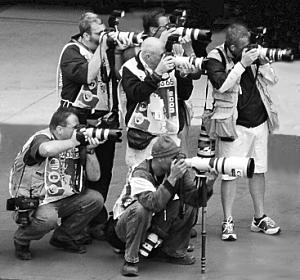 I’ve just received my new copy of the Marquette Law Review, which includes a fascinating collection of papers on the role of the media in international conflict resolution. This symposium issue emerged from the Law School’s conference on this topic last spring, which was organized by Professors Andrea Schneider and Natalie Fleury. In her introductory essay to the symposium, Andrea explains the genesis of the conference this way:
I’ve just received my new copy of the Marquette Law Review, which includes a fascinating collection of papers on the role of the media in international conflict resolution. This symposium issue emerged from the Law School’s conference on this topic last spring, which was organized by Professors Andrea Schneider and Natalie Fleury. In her introductory essay to the symposium, Andrea explains the genesis of the conference this way:
For conflict resolution scholars, the idea of focusing on the media is a logical one. After all, the media is the primary method through which the public and political leadership perceive and understand conflicts at home and abroad. If we are working to better handle these conflicts, the way that these conflicts are explained and understood is a crucial part of that process. Do the media have a responsibility to report all sides, even if one side is “wrong”? Do the media share in responsibility for escalation of a conflict if the reporting is incendiary? (The conviction of certain media figures involved in the Rwandan genocide and the use of “Tokyo Rose” during World War II are only two stark examples of how media can be directly involved in conflict.) And what of the responsibility of conflict specialists — are those of us in the conflict resolution field ignoring the media at our peril?
The symposium issue includes not only general, theoretical articles, but also case studies of specific conflicts from Iraq to Tibet to Peru. All of the articles can be downloaded from the Law Review’s website, as can video from the conference. The full list of articles and authors is after the jump. Congratulations to the editors of Volume 93 for a great first issue!
International Media and Conflict Resolution: Making the Connection — Andrea Kupfer Schneider
Is Journalism Interested in Resolution, or Only in Conflict? — John J. Pauly
In the Global Village, Can War Survive? — Susan G. Hackley
The Impact of News Coverage on Conflict: Toward Greater Understanding — Richard C. Reuben
Media and Conflict Resolution: A Framework for Analysis — Eytan Gilboa
Derelict of Duty: The American News Media, Terrorism, and the War in Iraq — Douglas M. McLeod
Negative and Positive Roles of Media in the Belgian Conflict: A Model for De-escalation — Martin Euwema and Alain Verbeke
Eliminationist Discourse in a Conflicted Society: Lessons for America from Africa? — Phyllis E. Bernard
Tibet and the Media: Perspectives from Beijing — Andrew Wei-Min Lee
Political Violence and the Media — Robert G. Meadow
Observations from an American Conflict Resolution Professional in Serbia on the Effects of the Accessibility of International Media2 — Lynn M. Malley
Mediating Post-Conflict Dialogue: The Media’s Role in Transitional Justice Processes — Lisa J. Laplante and Kelly Phenicie
A Post-KSR Consideration of Gene Patents: The “Obvious to Try” Standard Limits the Patentability of Genes — Ying Pan
A Delicate Balance of Life Tenure and Independence: Conditional Resignations from the Federal Bench — Allison A. Luczak
